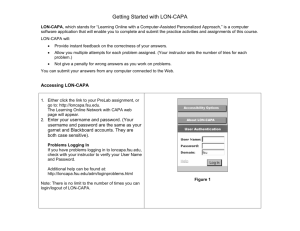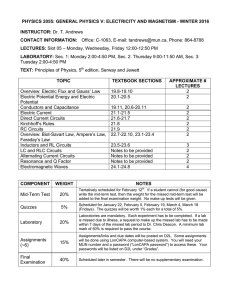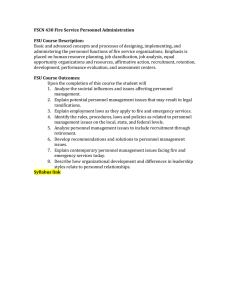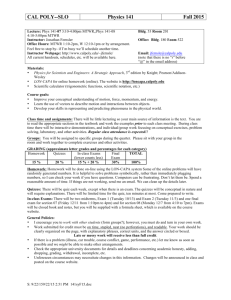Syllabus - General Physics B PHY 2049C, Spring 2013, Sections 1
advertisement
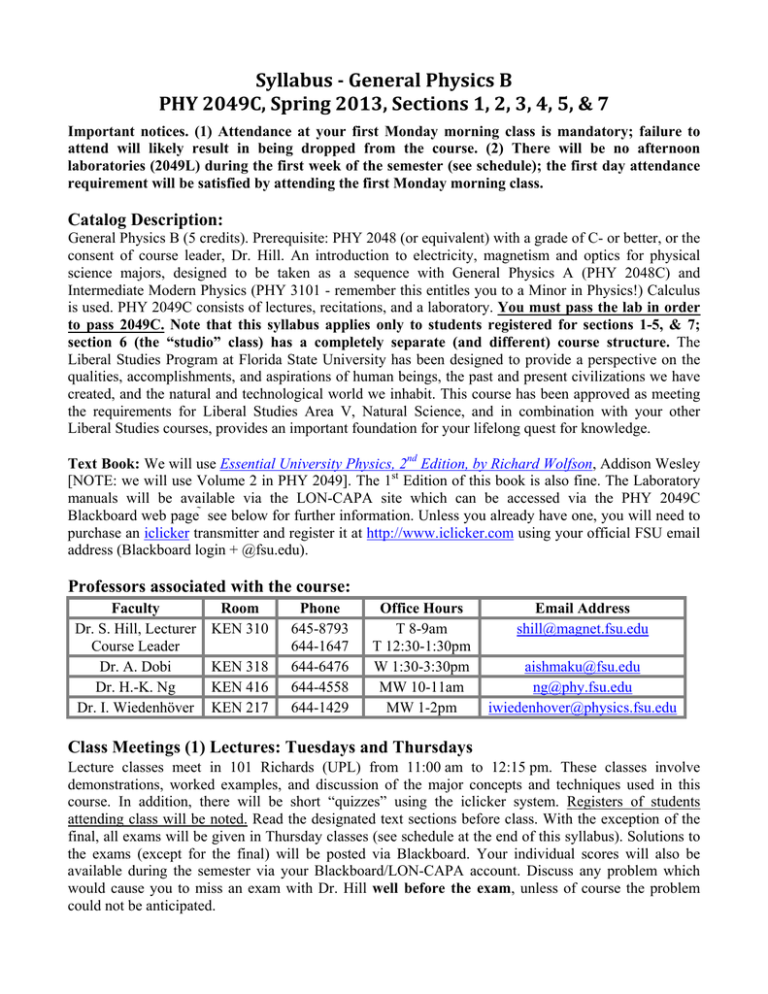
Syllabus - General Physics B PHY 2049C, Spring 2013, Sections 1, 2, 3, 4, 5, & 7 Important notices. (1) Attendance at your first Monday morning class is mandatory; failure to attend will likely result in being dropped from the course. (2) There will be no afternoon laboratories (2049L) during the first week of the semester (see schedule); the first day attendance requirement will be satisfied by attending the first Monday morning class. Catalog Description: General Physics B (5 credits). Prerequisite: PHY 2048 (or equivalent) with a grade of C- or better, or the consent of course leader, Dr. Hill. An introduction to electricity, magnetism and optics for physical science majors, designed to be taken as a sequence with General Physics A (PHY 2048C) and Intermediate Modern Physics (PHY 3101 - remember this entitles you to a Minor in Physics!) Calculus is used. PHY 2049C consists of lectures, recitations, and a laboratory. You must pass the lab in order to pass 2049C. Note that this syllabus applies only to students registered for sections 1-5, & 7; section 6 (the “studio” class) has a completely separate (and different) course structure. The Liberal Studies Program at Florida State University has been designed to provide a perspective on the qualities, accomplishments, and aspirations of human beings, the past and present civilizations we have created, and the natural and technological world we inhabit. This course has been approved as meeting the requirements for Liberal Studies Area V, Natural Science, and in combination with your other Liberal Studies courses, provides an important foundation for your lifelong quest for knowledge. Text Book: We will use Essential University Physics, 2nd Edition, by Richard Wolfson, Addison Wesley [NOTE: we will use Volume 2 in PHY 2049]. The 1st Edition of this book is also fine. The Laboratory manuals will be available via the LON-CAPA site which can be accessed via the PHY 2049C Blackboard web page see below for further information. Unless you already have one, you will need to purchase an iclicker transmitter and register it at http://www.iclicker.com using your official FSU email address (Blackboard login + @fsu.edu). Professors associated with the course: Faculty Dr. S. Hill, Lecturer Course Leader Dr. A. Dobi Dr. H.-K. Ng Dr. I. Wiedenhöver Room KEN 310 KEN 318 KEN 416 KEN 217 Phone 645-8793 644-1647 644-6476 644-4558 644-1429 Office Hours T 8-9am T 12:30-1:30pm W 1:30-3:30pm MW 10-11am MW 1-2pm Email Address shill@magnet.fsu.edu aishmaku@fsu.edu ng@phy.fsu.edu iwiedenhover@physics.fsu.edu Class Meetings (1) Lectures: Tuesdays and Thursdays Lecture classes meet in 101 Richards (UPL) from 11:00 am to 12:15 pm. These classes involve demonstrations, worked examples, and discussion of the major concepts and techniques used in this course. In addition, there will be short “quizzes” using the iclicker system. Registers of students attending class will be noted. Read the designated text sections before class. With the exception of the final, all exams will be given in Thursday classes (see schedule at the end of this syllabus). Solutions to the exams (except for the final) will be posted via Blackboard. Your individual scores will also be available during the semester via your Blackboard/LON-CAPA account. Discuss any problem which would cause you to miss an exam with Dr. Hill well before the exam, unless of course the problem could not be anticipated. Class Meetings (2) Tutorials: Monday and Wednesday mornings Tutorial (recitation) classes meet as scheduled below. This is where you will hone your problem solving skills in physics and, thus, they act as an excellent preparation for the exams, as well as helping with the homework assignments. Students will be expected to present their solutions to homework problems in class in order to receive credit for participation (6% of the final course grade). Homework is completed by inputting answers via the internet using the Learning Online Network with ComputerAssisted Personalized Approach (LON-CAPA) system. All LON-CAPA homework is due by 11:59pm on the assigned due date; the computer deadline system allows no exceptions! Section 1 2 3 4 5 7 Time: Mondays and Wednesdays 08:00-08:50 09:05-09:55 10:10-11:00 11:15-12:05 09:05-09:55 10:10-11:00 Instructor Room Dr. H.-K. Ng Dr. H.-K. Ng Dr. A. Dobi Dr. A. Dobi Dr. I. Wiedenhöver Dr. I. Wiedenhöver 107 UPL 107 UPL 107 UPL 107 UPL 112 UPL 112 UPL Class Meetings (3) Laboratory Classes: afternoons/evenings, Monday to Friday The purpose of the laboratory sessions is to gain hands-on experience with laboratory apparatus, to develop skills in performing experiments, and to learn methods for analyzing scientific data. Lab manuals will be available for download ahead of time via the LON-CAPA site. You should print out the manual and bring a copy with you to each lab. Every student must complete a lab report following the format prescribed by the lab instructor before leaving the lab session. Attendance at each lab session is a requirement of the course; any student who is not registered for 2049L needs to discuss this with Dr. Hill during the first week of classes. If you do not complete a missed lab, you do not get credit for that lab in your laboratory score (see below). If you miss more than two labs you will automatically receive an “F” grade for the entire course. Please make sure you do all of the labs! Section 1 2 3 4 5 6 7 8 9 10 Day Monday Monday Tuesday Tuesday Wednesday Wednesday Thursday Thursday Thursday Friday Time (all pm) 12:30 – 3:30 3:45 – 6:45 12:30 – 3:30 3:45 – 6:45 12:30 – 3:30 3:45 – 6:45 12:30 – 3:30 3:45 – 6:45 7:00 – 10:00 12:30 – 3:30 Room 114 UPL 114 UPL 114 UPL 114 UPL 114 UPL 114 UPL 114 UPL 114 UPL 110 UPL 114 UPL Instructor (TA, Faculty) Zhou, Ng Menendez Santiago, Ng Kolak, Wiedenhoever Menendez Santiago, Wiedenhoever Akinfaderin, Dobi Zhou, Dobi Kolak, Hill Shiddiq, Hill Shiddiq, Hill Akinfaderin, Dobi Examinations: During the semester, there will be six mini-exams, one mid-term exam, and one final exam. The subject of each exam may include any previously assigned material. With the exception of the final, all exams will be given in the Thursday classes (see schedule below). Only your best five miniexam scores will be counted (see below), representing a very significant fraction (25%) of your final grade and a very important component of the course. Below are a few rules and answers to common questions about these exams. • Six mini-exams will be given during the semester (see schedule below). • All mini-exams will be given at the beginning of the lecture. • The material covered will be related to recent or previous LON-CAPA assignment topics. Do not expect to see exact copies of LON-CAPA questions though. • Each mini-exam will last 25 minutes and must be handed in by the required deadline. • Students arriving late must turn in their mini-exam by the same deadline as the rest of the class. • Your final mini-exam score will be based on your five best exam scores. • Each student is responsible for bringing a working calculator. You are not allowed to utilize equations or physics text programmed into your calculator. • The use of smart/cell phones is strictly forbidden during any exam. • All students must bring their FSU ID card with them to all exams. • Do not cheat! Cheating on an exam will result in an "F" grade for the course. • Any grading questions must be resolved with Dr. Hill within 2 weeks of the exam. Completion of Course and Grading: The course grade will be calculated using the grades from the LON-CAPA problem sets, attendance at recitation classes, the mini-exams and iclicker quizzes/ attendance, the mid-term exam, the laboratory reports, and the final exam. These components will be weighted in the following way. Your final grade will be based on your total score in all of these areas. The total course score will then be converted into a letter grade. We will use the table shown below as our guide for determining final grades: Best 5 of 6 Mini-Exams Iclicker answers/attendance Mid Term Exam Final Examination Laboratory LON-CAPA homework Recitation Participation Total 25% 5% 10% 20% 20% 14% 6% 100% Grade A AB+ B B- Score 100 – 90 89.9 – 87 86.9 – 83 82.9 - 79 78.9 – 75 Grade C+ C CD F Score 74.9 – 71 70.9 – 67 66.9 – 62 61.9 - 55 54.9 - 0 Students who do not attempt the final exam will automatically receive a grade of “F” for the course. If you miss more than two labs you will automatically receive a grade “F” for the course. You should keep a record of your point totals for LON-CAPA, the laboratories and exams. FSU Academic Honor Policy: The Florida State University Academic Honor Policy outlines the University’s expectations for the integrity of students’ academic work, the procedures for resolving alleged violations of those expectations, and the rights and responsibilities of students and faculty members throughout the process. Students are responsible for reading the Academic Honor Policy and for living up to their pledge to “…be honest and truthful and… [to] strive for personal and institutional integrity at Florida State University.” (Florida State University Academic Honor Policy, found at http://academichonor.fsu.edu/policy/policy.html.) University Attendance Policy: Excused absences include documented illness, deaths in the family and other documented crises, call to active military duty or jury duty, religious holy days, and official University activities. These absences will be accommodated in a way that does not arbitrarily penalize students who have a valid excuse. Consideration will also be given to students whose dependent children experience illness. Resources for Students: We want you all to do well in this course. There are resources available to help you towards this goal. Please take advantage of them. • Classes: Attend lectures and recitations. You may not realize it at the time, but what you learn and retain from these classes may surprise you and serve you well during exams. • Professors’ office hours: Each of the faculty members associated with this course have scheduled office hours to help students with homework problems and other matters that arise during the course. These times are given at the beginning of this document. Other times may be arranged. Please don't hesitate to call or email us. • Physics Department consultation sessions: After the 2nd or 3rd week of classes, a graduate student will be available to assist you with your LON-CAPA homework and in keeping up your average score on the mini-exams! These times are given below. TA Day Time Chris Pedersen M, T, W (R) 4:30 – 7:00pm (5:15 to 7:45pm) Room Dirac Science Library Free Tutoring from FSU: ACE Learning Studio (http://ace.fsu.edu/) in Johnston Ground (WJB) will have tutoring available for PHY2049C and 2049L during Spring semester, 2013. Tutoring is free for all enrolled FSU undergraduate students, and appointments can be made by calling 645-9151, logging on to Blackboard Secure Apps, or stopping by. When possible, group tutoring sessions can be arranged around posted test dates. These services are offered by tutors trained to encourage the highest level of individual academic success while upholding personal academic integrity. Individual Tutors: If you would like to hire a tutor, check with Ms. Melissa Wolff in the Physics Graduate/Undergraduate Office on the 3rd floor of the Keen Building (KEN 304). She can also be reached either by e-mail (ugrad@physics.fsu.edu) or by calling 644-3245. Ms. Wolff has a hardcopy list of physics graduate students who are happy to work (for pay) as tutors. Americans With Disabilities Act: Students with disabilities needing academic accommodations should: (1) register with and provide documentation to the Student Disability Resource Center; and (2) bring a letter to the instructor indicating the need for accommodation and what type. This should be done during the first week of class. This syllabus and other class materials are available in alternative format upon request. For more information about services available to FSU students with disabilities, contact the: Student Disability Resource Center 874 Traditions Way 108 Student Services Building Florida State University Tallahassee, FL 32306-4167 (850) 644-9566 (voice) (850) 644-8504 (TDD) sdrc@admin.fsu.edu http://www.disabilitycenter.fsu.edu/ Course and LON-CAPA Information on the web: This syllabus, the lab manuals and other information (exam solutions, etc.) related to this course will be posted on Blackboard (http://campus.fsu.edu) and the accompanying LON-CAPA site (http://loncapa.fsu.edu/). In order to attempt the LON-CAPA assignments you must have access to the internet. There are numerous computer labs on campus and in the libraries. The Physics Department also has a number of computers that may be used for LON-CAPA, both in your recitation classroom and in the Undergraduate Study Room in KEN 701. If you have any difficulties locating a computer please contact your recitation instructor. Instructions for using LONCAPA are also available online. Some Sensible Advice: We want everyone to pass this course. Unfortunately many people find doing physics rather difficult. Below are a few tips to help make your adventures in physics fun. • Physics is based on understanding, not memorization. We will do all we can to help you, but only you can know whether you really understand something or not! Test yourself on additional problems. If, after reading additional problems, you have no idea how to solve them, then you have not understood the concepts. Do not simply regurgitate the answers. • Physics and math are intimately related. Refresh and apply your math skills to solve the problems. • If you attend all classes and seek help from your instructors during office hours, you should be able to score close to 100% on the LON-CAPA assignments. This will, in-turn, help you on the exams. You will be throwing away easy credit, and will almost certainly not succeed in this course if you do not take these assignments seriously. • In order to prepare for the exams make sure you understand and can do all of the homework problems on your own. You are strongly encouraged to do extra problems. Do not just memorize the LONCAPA solutions. • In answering a question, always ask yourself ``Is this answer sensible?" Always check through your solution and don't forget to put the units in! • Attend all lectures, laboratories and tutorial classes. • Use the textbook. Try to find time to look over a chapter before and after it is covered in class. • Use the professors' office hours. • Find a study partner. We strongly encourage students to study and learn together. • Finally, don't give up or sit for hours trying to do the homework. Discuss your solutions with us. Often you will be much closer than you think to being able to solve a problem. • If you are thinking of dropping the course at any point, please come and talk to Dr. Hill first. Daily Schedule and Assignments: Date M 7-Jan T 8-Jan W 9-Jan Th 10-Jan M 14-Jan T 15-Jan W 16-Jan Th 17-Jan M 21-Jan T 22-Jan W 23-Jan Th 24-Jan M 28-Jan T 29-Jan W 30-Jan Th 31-Jan M 4-Feb T 5-Feb W 6-Feb Th 7-Feb Schedule and Assignments Welcome! Syllabus handed out. Mandatory attendance. Lecture 1: Intro. and Ch. 20 – Electric fields Discuss LONCAPA problem set #1 (Electric Field I) Lecture 2: Ch. 20 – Electric fields LONCAPA set #1 DUE (Electric Field I) Lecture 3: Ch. 20/21 – Electric fields and Gauss’ law LONCAPA set #2 DUE (Electric Field II) Lecture 4: Ch. 21 – Gauss’ law. Mini Exam #1 Martin Luther King day – no classes Lecture 5: Ch. 21 – Gauss’ law LONCAPA set #3 DUE (Electric Field III) Lecture 6: Ch. 22 – Potential LONCAPA set #4 DUE (Electric Field IV) Lecture 7: Ch. 22 – Potential LONCAPA set #5 DUE (Potential I) Lecture 8: Ch. 23 – Capacitance. Mini Exam #2 LONCAPA set #6 DUE (Potential II) Lecture 9: Ch. 23 – Energy and capacitance LONCAPA set #7 DUE (Energy & capacitance I) Lecture 10: Ch. 24 – DC current Laboratory No laboratory classes this week. Lab 1 “Distribution functions”. No laboratory classes this week due to the Monday holiday. Lab 2 “Electric and magnetic fields”. Lab 3 “Ohm’s law and DC circuits”. M 11-Feb T 12-Feb W 13-Feb Th 14-Feb M 18-Feb T 19-Feb W 20-Feb Th 21-Feb M 25-Feb T 26-Feb W 27-Feb Th 28-Feb M 4-Mar T 5-Mar W 6-Mar Th 7-Mar LONCAPA set #8 DUE (Energy & capacitance II) Lab 4 “Ammeters and Lecture 11: Ch. 25 – DC circuits voltmeters”. LONCAPA set #9 DUE (Electric Current & Circuits I) Lecture 12: Ch. 25 – DC circuits. Mini Exam #3 LONCAPA set #10 DUE (Electric Current & Circuits II) Lab 5 “Null comparator Lecture 13: Ch. 26 – Magnetic fields/forces instrument”. LONCAPA set #11 DUE (Network Circuits) Lecture 14: Ch. 26 – Sources of magnetic field LONCAPA set #12 DUE (Magnetic field I) No laboratory classes Lecture 15: Catch-up and review for mid-term this week. Use the Mid-term Review (No LONCAPA) extra time to prepare Lecture 16: Mid Term Exam for the mid-term. LONCAPA set #13 DUE (Sources of Magnetic Field I) Lab 6 “Functions of an Lecture 17: Ch. 26 – Sources of magnetic field oscilloscope ”. Review mid-term solutions (No LONCAPA) Lecture 18: Ch. 27 – Magnetic induction SPRING BREAK M 18-Mar LONCAPA set #14 DUE (Sources of Magnetic Field II) Lab 7 “AC circuits I”. T 19-Mar Lecture 19: Ch. 27 – Magnetic induction W 20-Mar LONCAPA set #15 DUE (Magnetic Induction I) Th 21-Mar Lecture 20: Ch. 28 – AC circuits. Mini Exam #4 M 25-Mar LONCAPA set #16 DUE (Magnetic Induction II) Lab 8 “AC circuits II”. T 26-Mar Lecture 21: Ch. 28 – AC circuits W 27-Mar LONCAPA set #17 DUE (AC Circuits I) Th 28-Mar Lecture 22: Ch. 29 – Maxwell’s equations M 1-Apr LONCAPA set #18 DUE (AC Circuits II) Lab 9 “Light and lasers”. T 2-Apr Lecture 23: Ch. 29 – Electromagnetic waves W 3-Apr LONCAPA set #19 DUE (AC Circuits III) Th 4-Apr Lecture 24: Ch. 30 – Light. Mini Exam #5 M 8-Apr LONCAPA set #20 DUE (Electromagnetic Waves) Lab 10 “Optical T 9-Apr Lecture 25: Ch. 30 – Light instruments”. W 10-Apr LONCAPA set #21 DUE (Light) Th 11-Apr Lecture 26: Ch. 31 – Optics M 15-Apr LONCAPA set #22 DUE (Optical Instruments I) Lab 11 “Diffraction T 16-Apr Lecture 27: Ch. 31 – Optics grating”. W 17-Apr LONCAPA set #23 DUE (Optical Instruments II) Th 18-Apr Lecture 28: Ch. 32 – Interference/diffraction. Mini Exam #6 M 22-Apr LONCAPA set #24 DUE (Interference & Diffraction I) No Labs this week. T 23-Apr Lecture 29: Ch. 32 – Interference/diffraction & Review W 24-Apr LONCAPA set #25 DUE (Interference & Diffraction II) Th 25-Apr Lecture 30: Review for final Note: the topics listed for each of the T/Th lectures are tentative and may be subject to change. Final Exam: Tuesday, April 30th, 12:30 - 2:30 pm; Location TBA Syllabus Change Policy: Except for changes that substantially affect implementation of the evaluation (grading) statement, this syllabus is a guide for the course and is subject to change with advance notice.
